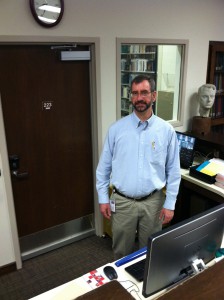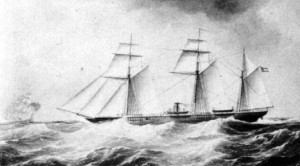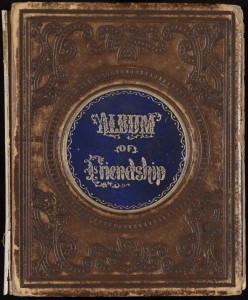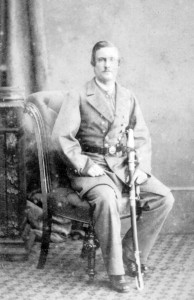By: Kevin Ray, Archival Technician
Hello! Thank you for agreeing to talk to us about your role at in the Division of Special Collections. First off, can you tell us a bit about your position?
My current title is Archival Technician, but I do several different jobs. I moved into this position in May, 2013.
Initially, I was going to be processing manuscript collections, but things have changed over the past year. When Jessica Lacher-Feldman left last June to become the Director of the Louisiana State University’s Special Collections, I began handling reference for our Special Collections. This includes all outside reference requests whether by email, telephone, or snail mail. I also spend several hours each week working the reference desks in the Hoole Library and in the Williams Collection in Gorgas. Reference desk time is split among most of the staff in Special Collections, and some of us work in both Williams and Hoole. I make the schedule each week. I also handle requests for permission to publish.
Now that Tom Land is retiring, I have added building representative to my list of duties, and I’m getting involved in university archives again. I also manage statistics for Special Collections.
What previous roles have you had in the Division of Special Collections?
I have worked in a number of areas in Special Collections over the years. I’ve worked in just about every area of the department except published materials. I began as a work-study student in the early 1990s, and got my start processing manuscript collections. When I graduated in 1993, I was hired as a Library Clerk and later Library Assistant. At that time, I processed manuscript and audio-visual collections and helped on the reference desk.
I left Special Collections in 1996, but came back again in 2002. When I returned, I was a Temporary Project Archivist for a couple of years and processed the Tom Bevill Congressional Papers. In 2004, I returned to full-time permanent status as Institutional Records Assistant and worked with Tom Land in University Archives until I moved into my current position last year. University Archives is the part of Special Collections that manages official university records, both permanent and temporary. This includes president’s papers, human resource files, accounting records, and even medical charts from the Student Health Center and University Medical Center.
How did you get started in this field?
I worked in Hoole as a work-study student during my undergraduate years. That was my first exposure to the field and I really enjoyed it. The material was, and still is, fascinating. It was perfect for someone who was interested in history.
After graduation, I was fortunate enough to continue working here and doubly fortunate to be able to return after being away for a few years. While working in Hoole in the 1990s, I earned an MLIS. That helped me qualify for the Project Archivist position and allowed me to return to Special Collections. I am very happy to be back here.
Can you describe your average day in Special Collections?
As the particulars of my job duties have changed over the past year so have the particulars of what might be described as an average day. Currently, on an average day, I check our reference email account and follow up with the incoming questions and requests. That might mean doing a quick search to answer a simple question, or guiding a researcher to the material they need. Sometimes I schedule appointments for students to visit special collections and work on class projects. Sometimes I teach them basic research skills. I spend part of each day at the reference desk, either in Hoole or Williams. I’m now more involved on a daily basis with university archives.
A successful conclusion to a research question or project is my favorite part. That’s the bottom line. We are here to provide a service, and if I am able to do that successfully and the patron is pleased, then I’m pleased as well.
The actual reference process can also be really interesting. Sometimes I learn something new, other times I get a chance to refresh my memory. There is so much to know about the holdings in Special Collections. With the addition of the Williams Collection, there is even more to learn and to remember. Working at the reference desk is one of the best ways to learn about the material we have. It forces you learn about material that is outside of your normal job area. Working with researchers helps me keep up with the material that we have. It gets me into areas where I would not normally have as much exposure. The more I learn, and the more I remember, the better equipped I am to help researchers get to that successful conclusion.
What do you wish more researchers knew about our collections?
I wish more researchers knew about the scope of our material, but also about its limits. We have a broad range of material in terms of subject matter, format, time period, and geographical location. Special Collections houses all of the university’s archival records going back to the beginning. We hold a wide range of material about the State of Alabama, in print, manuscript, and audio-visual formats. The same is true for material about the southern United States. We house rare books, hand-made books from the Book Arts program, and enormous collections of photographs and sound recordings. There really is something for everyone in Special Collections.
That said, there are limits to what we have available for research. Some collections and items are restricted for various reasons. Researchers don’t always realize that access to certain materials may be limited or may be denied altogether. This is especially true for certain manuscript collections and for certain material in university archives. Despite the large volume of material that we have, there are some things that we just do not have. For students who want to use Special Collections for a class paper or project, it is always advisable to inquire ahead before picking a topic to make sure that we have suitable material to cover the topic.
One final thing for researchers to remember is that the world of archives and special collections is not necessarily an “on demand” world. The research requires time, patience, and hard work. Identifying an item or collection that you want to see is just the beginning. Some collections may be open for research, but they may not have a detailed finding aid to help locate relevant items, or they may be very large and searching them may be time consuming. Research in Special Collections can be a little like a treasure hunt. Sometimes you find the treasure you are looking for and sometimes you don’t, but you won’t know if it’s there or not until you look.
Do you have a favorite item or collection?
I don’t have a single favorite item, but there are a lot of collections and individual items that I really like. The early records of the university would be near the top of my long list of favorite things. There’s so little of the early material that has survived. Also, Basil Manly’s diaries are really interesting. He was the second president of the university and he commented on everything. He wrote about student discipline, slavery, and problems with faculty. He gives us a unique glimpse into life on campus in its earliest days.
There are a lot of items in the photograph collections that I really like, such as the Edward Maffitt Anderson Photograph Album of the officers and crew of CSS Alabama, and the Dominique Fiquet Photograph Album, also known as the Album of Friendship. Fiquet’s album contains pictures of President Garland, faculty members, members of the graduating class of 1859, and a photograph of the Rotunda. There are so many other collections and items that I could mention. It’s hard to have an actual favorite when there is so much to pick from.
Thank you for talking to us today!





One Response to Interview with Kevin Ray, Archival Technician